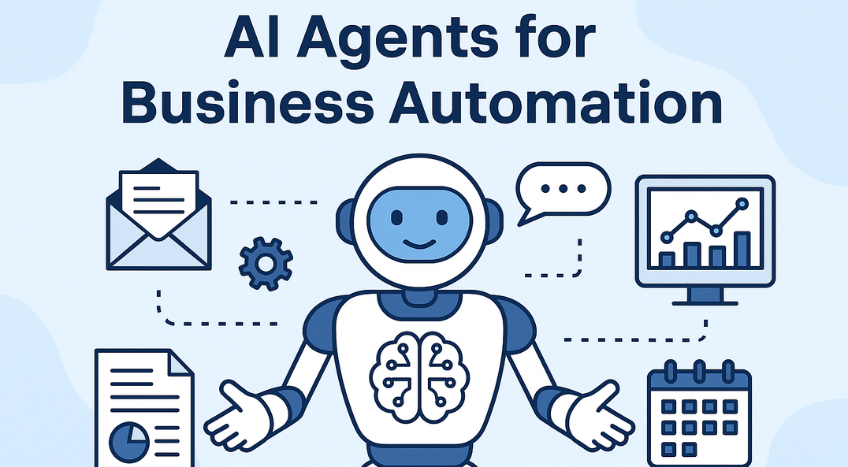
In today’s fast-paced digital economy, businesses are under immense pressure to increase efficiency, reduce costs, and deliver superior customer experiences. Enter AI agents for business automation — intelligent systems that mimic human decision-making and carry out complex tasks across departments, freeing up valuable human time for strategic initiatives.
These autonomous agents represent the next frontier of intelligent automation, revolutionizing everything from customer service to operations and marketing.
What Are AI Agents?
AI agents are autonomous, goal-driven programs powered by generative AI, natural language processing (NLP), and machine learning (ML). Unlike traditional bots or rule-based automation tools, these agents can understand context, learn from data, make decisions, and even interact with humans or other systems to complete tasks.
Think of them as digital co-workers capable of handling emails, booking meetings, managing CRM updates, responding to customer queries, generating reports, or even optimizing supply chain logistics — all with minimal human input.
Key Benefits of AI Agents in Business Automation
1. 24/7 Availability and Faster Response Times
AI agents don’t sleep. They work round the clock to handle incoming tasks, enabling companies to offer uninterrupted service and support across time zones. In industries like e-commerce or SaaS, this leads to improved customer satisfaction and loyalty.
2. Scalability Without Hiring Costs
Hiring and training employees to meet growing demand can be time-consuming and expensive. With AI agents, businesses can scale operations seamlessly without increasing headcount. This is especially valuable for startups and growing enterprises with limited resources.
3. Workflow Efficiency and Task Automation
AI agents integrate with existing tools (like CRMs, ERPs, and help desks) to automate repetitive tasks such as data entry, invoice generation, and order tracking. This boosts workflow efficiency, reduces human error, and accelerates decision-making.
4. Cost Reduction
By automating routine and manual tasks, organizations save significantly on labor costs and operational overheads. AI agents also help minimize costly mistakes caused by manual processing.
5. Real-Time Insights and Reporting
With access to enterprise data, AI agents can generate real-time insights, dashboards, and performance reports. Business leaders can then make data-backed decisions faster and with greater confidence.
Use Cases of AI Agents Across Industries
🏢 Customer Support
AI-powered chatbots and voice assistants handle Tier 1 and Tier 2 support tickets, route queries intelligently, and offer real-time solutions—reducing wait times and improving resolution rates.
📊 Sales and Marketing Automation
From prospecting and lead scoring to email outreach and campaign optimization, AI agents assist sales and marketing teams in targeting the right audience with personalized content.
📦 Operations and Supply Chain
AI agents monitor inventory levels, predict demand, automate procurement, and flag anomalies—ensuring smoother operations and fewer bottlenecks.
💼 HR and Recruitment
AI agents screen resumes, schedule interviews, onboard new hires, and manage employee queries, making HR processes more efficient and less time-consuming.
📈 Finance and Accounting
Automated invoice generation, expense tracking, budgeting, and fraud detection can now be handled by intelligent agents—ensuring accuracy and compliance.
How AI Agents Differ from Traditional Automation
| Feature | Traditional Automation | AI Agents |
| Logic | Rule-based | Adaptive & learning-based |
| Flexibility | Rigid workflows | Context-aware decisions |
| Human Interaction | Minimal or none | Natural language processing (NLP) |
| Scalability | Limited by rules | Scales with data and goals |
| Intelligence | Predefined actions | Autonomous and generative |
Traditional automation is excellent for structured, repetitive tasks. However, AI agents bring flexibility, reasoning, and adaptability, making them ideal for dynamic business environments.
Challenges and Considerations
Despite their benefits, AI agents come with their own set of challenges:
- Data Privacy & Security: Handling sensitive data requires robust compliance with regulations like GDPR or HIPAA.
- Integration Complexity: AI agents must be integrated into existing IT infrastructure smoothly.
- Bias and Accuracy: Improperly trained AI can inherit biases or make incorrect decisions without oversight.
- Change Management: Teams need training and buy-in to trust AI agents and adapt their workflows.
Mitigating these risks involves proper training datasets, human oversight, and ethical AI frameworks.
The Future of Business Automation with AI Agents
With the rapid evolution of generative AI platforms like OpenAI’s GPT, Anthropic’s Claude, and others, AI agents are becoming more capable and customizable than ever before. Future agents will not just follow commands — they’ll collaborate, strategize, and innovate alongside humans.
We’re moving toward a workplace where humans and AI agents work hand-in-hand, amplifying productivity, creativity, and agility. Enterprises that embrace this shift early will gain a significant competitive edge.
Final Thoughts
AI agents are redefining business automation by bringing intelligence, autonomy, and adaptability into enterprise operations. From improving workflow efficiency to transforming customer experiences, these agents are set to become indispensable digital teammates in the years ahead.
As we continue into this AI-first era, businesses must evaluate where and how to implement AI agents—not just for efficiency, but for long-term growth and innovation.

